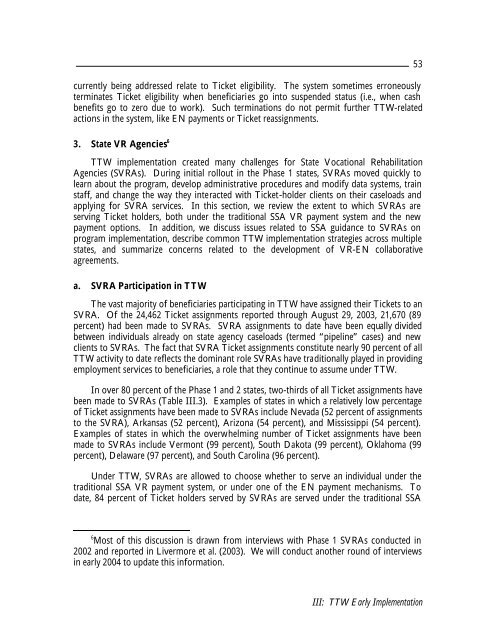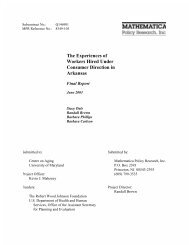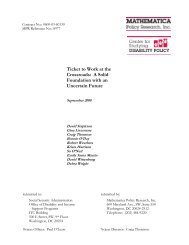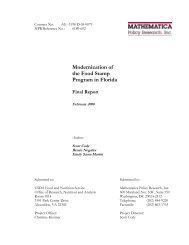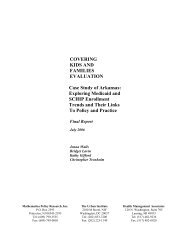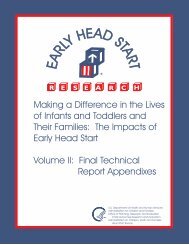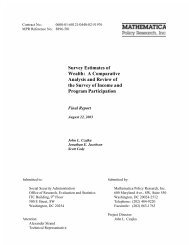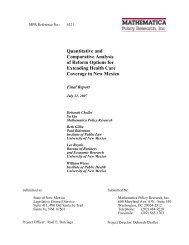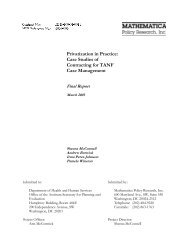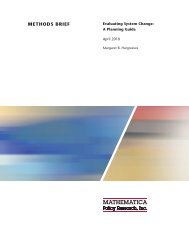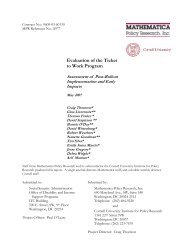Evaluation of the Ticket to Work Program Initial Evaluation Report
Evaluation of the Ticket to Work Program Initial Evaluation Report
Evaluation of the Ticket to Work Program Initial Evaluation Report
Create successful ePaper yourself
Turn your PDF publications into a flip-book with our unique Google optimized e-Paper software.
currently being addressed relate <strong>to</strong> <strong>Ticket</strong> eligibility. The system sometimes erroneously<br />
terminates <strong>Ticket</strong> eligibility when beneficiaries go in<strong>to</strong> suspended status (i.e., when cash<br />
benefits go <strong>to</strong> zero due <strong>to</strong> work). Such terminations do not permit fur<strong>the</strong>r TTW-related<br />
actions in <strong>the</strong> system, like EN payments or <strong>Ticket</strong> reassignments.<br />
3. State VR Agencies 6<br />
TTW implementation created many challenges for State Vocational Rehabilitation<br />
Agencies (SVRAs). During initial rollout in <strong>the</strong> Phase 1 states, SVRAs moved quickly <strong>to</strong><br />
learn about <strong>the</strong> program, develop administrative procedures and modify data systems, train<br />
staff, and change <strong>the</strong> way <strong>the</strong>y interacted with <strong>Ticket</strong>-holder clients on <strong>the</strong>ir caseloads and<br />
applying for SVRA services. In this section, we review <strong>the</strong> extent <strong>to</strong> which SVRAs are<br />
serving <strong>Ticket</strong> holders, both under <strong>the</strong> traditional SSA VR payment system and <strong>the</strong> new<br />
payment options. In addition, we discuss issues related <strong>to</strong> SSA guidance <strong>to</strong> SVRAs on<br />
program implementation, describe common TTW implementation strategies across multiple<br />
states, and summarize concerns related <strong>to</strong> <strong>the</strong> development <strong>of</strong> VR-EN collaborative<br />
agreements.<br />
a. SVRA Participation in TTW<br />
The vast majority <strong>of</strong> beneficiaries participating in TTW have assigned <strong>the</strong>ir <strong>Ticket</strong>s <strong>to</strong> an<br />
SVRA. Of <strong>the</strong> 24,462 <strong>Ticket</strong> assignments reported through August 29, 2003, 21,670 (89<br />
percent) had been made <strong>to</strong> SVRAs. SVRA assignments <strong>to</strong> date have been equally divided<br />
between individuals already on state agency caseloads (termed “pipeline” cases) and new<br />
clients <strong>to</strong> SVRAs. The fact that SVRA <strong>Ticket</strong> assignments constitute nearly 90 percent <strong>of</strong> all<br />
TTW activity <strong>to</strong> date reflects <strong>the</strong> dominant role SVRAs have traditionally played in providing<br />
employment services <strong>to</strong> beneficiaries, a role that <strong>the</strong>y continue <strong>to</strong> assume under TTW.<br />
In over 80 percent <strong>of</strong> <strong>the</strong> Phase 1 and 2 states, two-thirds <strong>of</strong> all <strong>Ticket</strong> assignments have<br />
been made <strong>to</strong> SVRAs (Table III.3). Examples <strong>of</strong> states in which a relatively low percentage<br />
<strong>of</strong> <strong>Ticket</strong> assignments have been made <strong>to</strong> SVRAs include Nevada (52 percent <strong>of</strong> assignments<br />
<strong>to</strong> <strong>the</strong> SVRA), Arkansas (52 percent), Arizona (54 percent), and Mississippi (54 percent).<br />
Examples <strong>of</strong> states in which <strong>the</strong> overwhelming number <strong>of</strong> <strong>Ticket</strong> assignments have been<br />
made <strong>to</strong> SVRAs include Vermont (99 percent), South Dakota (99 percent), Oklahoma (99<br />
percent), Delaware (97 percent), and South Carolina (96 percent).<br />
Under TTW, SVRAs are allowed <strong>to</strong> choose whe<strong>the</strong>r <strong>to</strong> serve an individual under <strong>the</strong><br />
traditional SSA VR payment system, or under one <strong>of</strong> <strong>the</strong> EN payment mechanisms. To<br />
date, 84 percent <strong>of</strong> <strong>Ticket</strong> holders served by SVRAs are served under <strong>the</strong> traditional SSA<br />
53<br />
6 Most <strong>of</strong> this discussion is drawn from interviews with Phase 1 SVRAs conducted in<br />
2002 and reported in Livermore et al. (2003). We will conduct ano<strong>the</strong>r round <strong>of</strong> interviews<br />
in early 2004 <strong>to</strong> update this information.<br />
III: TTW Early Implementation


